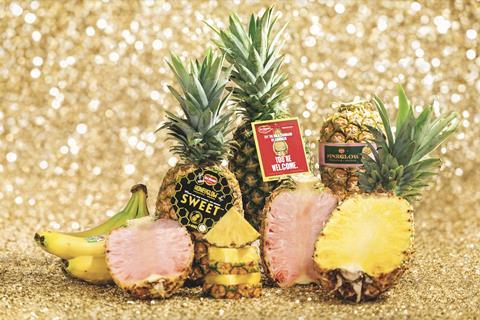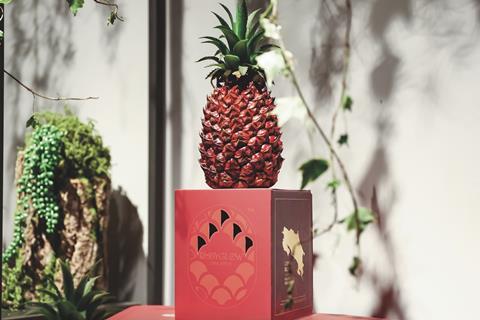Ahead of Fruitnet Tropicals Congress in Antwerp, Thierry Montange highlights the pineapple innovations that are driving growth in the segment – particularly when it comes to the luxury side of the category

Fresh Del Monte has established a clear roadmap to growing the pineapple category across its value chain. That is according to Thierry Montange, the fresh produce company’s marketing director for Europe and Africa.
“One of the pillars of our strategy is an upward consumer segmentation of the pineapple market,” Montange tells Fruitnet. “Our most recent launches in Europe, like the high shell colour and high sweetness of the Honeyglow pineapple, or the ‘48-hours- field-to-fork’ Gold By Air pineapple, and the naturally matured Del Monte Original pineapple, are all highly appreciated by the consumer and are among the fastest-growing items in the produce market across Europe.”
The group continues to drive the global luxury fruit segment, he says, and has launched two cutting-edge innovations in recent times. These are the Pinkglow pineapple, notable for its “stunning pink flesh that has been an instant blockbuster in North America, the Middle East and Asia”, and the Rubyglow pineapple, “whose magnificent red-colour shell and sweet taste make it the most desirable fruit for premium fruit lovers globally”.
On a wider scale, this year is proving to be a tough one for global pineapple supply. While demand for the fruit shows no sign of slowing – and according to Montange has even grown in key markets – supply has been significantly reduced, primarily due to a range agricultural and logistical factors. A greater range of production areas is something being explored moving forwards.

“The global picture of fresh pineapple production does not change day to day,” he continues. “It is a crop that requires large amounts of land and long lead times. Costa Rica, the undisputed largest global exporter, has experienced some reduced availability, and other producing countries are also showing less availability. We follow this very closely and seek new production areas across the globe. There is certainly an expectation to see more diversified origins in the future.”
Demand for pineapples among consumers remains as high as ever, although the fruit enjoys a unique consumption pattern when compared with some of the best-sellers in supermarkets worldwide.
“Pineapple is often nicknamed the ‘King of Fruits’ in the produce aisle because of its unique visual characteristics and taste, and a great value,” Montange outlines. “That said, its consumption pattern is different from other high-volume items like bananas or apples. Because of their size, pineapples are less anchored in the daily moments of the household. On the contrary, we notice that fresh prepared pineapple items in slices or chunks give shoppers the convenience and portion size they’re looking for and therefore are increasingly selected by smaller households.”
There is good news, he confirms, as in Europe the company is now seeing a growing community of loyal and frequent ‘pineapple lovers’ that search on a weekly or biweekly basis for the taste and nutrition of brands like Del Monte. These shoppers also show a lot of interest in sustainability and the quality reassurance that Del Monte provides, and represent a segment of consumers that particularly enjoys innovations like the Honeyglow pineapple.
Del Monte has developed a wide variety of marketing touchpoints to further engage with these and other shoppers.
“At point of sale, Del Monte-branded displays help to anchor the fruit within the exotic offer,” explains Montange. “We have successfully implemented a ’ten-second peeling and packing’ self-service Del Monte pineapple cutting machine with selected retailers. These machines provide a great option for shoppers that don’t want to peel and cut the fruit at home.
“Also, we saw a boost in the consumption of families with kids from our marketing partnerships with global movie franchises like Jurassic World, Kung Fu Panda, Miraculous or Disney/Pixar. All of them have greatly engaged both kids and parents and enlarged our consumer audience base, while helping us stand out in the produce aisle. Convincing more kids to eat fresh pineapple is a key mission for us that we are making great progress on.”

Sustainability and social responsibility are a fundamental pillar of Del Monte’s operations, and the pineapple segment is no different, according to Montange.
“In our Kenya operations, we are working towards a circular economy and are reusing the pineapple byproducts from our pineapple cannery for textiles, animal feed, and more,” he adds. “This ensures the entire fruit is used in some way, reduces food waste, and supports the local community.”



